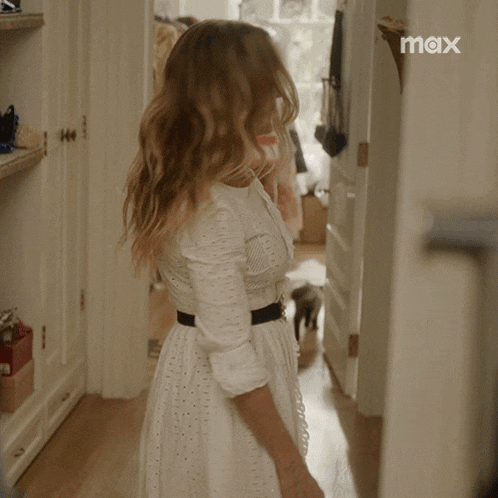The Scene from "And Just Like That" that I Won’t Forget
For a brief minute, we were all the uncomfortable bystanders in Aiden’s living room.
[Spoilers ahead for season three of “And Just Like That”]
I, like many women of a certain age, was a Sex and the City devotee at the turn of the millenium. I saw these women as an emblem of what a successful work and life balance would look like: meaningful friendships, various forms of families, work they enjoyed and enough financial security to have fun in a way that felt both aspirational but also somewhat attainable.
But And Just Like That, which came to an end this past month, was for the most part, a disappointment. I was expecting the same pull-back-the-curtain-and-reveal-big-truths watching experience that came with the first six seasons. What we got instead was some of the same tropes repeated, a lot of silly moments that seemed better suited to a laugh track than a HBO show (Charlotte falling on the naked woman in the art show? Miranda eating all of Carrie’s food when they are roommates because they can’t seem to communicate? Come on, HBO Max, do better).
But there was one moment that I thought: Whoa. Here it is. This is the Sex and the City I know and remember.
In season three of And Just Like That, Carrie visits Aiden on his farm in rural Virginia where — now divorced — he shares custody of his three kids, the youngest of whom is Wyatt, a neurodivergent teen going through a rough patch. Thus far, most of this struggle is off screen; Carrie’s only understanding of it is that Aiden can’t visit or talk with her because he needs to be available for Wyatt.
And in typical Carrie fashion, we see little to no interest on her end to understand Wyatt or to learn what might be roiling him. She instead focuses on doodling cute postcards to send to Aiden and discussing with her friends her abject horror that Aiden’s ex-wife Kathy has called begging that Carrie bring Adderall from New York City. Kathy’s plea becomes a punch line again: Charlotte strolls across the bakery to her Park Avenue moms who can easily find Adderall when so many pharmacies cannot. “I’m practically a CVS!” one of the moms tells her. How funny! How Sex and the City!
Except — wait. What does it actually mean to need medication for your child and not be able to find (or afford) it? Is it possible that some people rely on Adderall not because they want to rear perfect children but because it helps them function, become less impulsive, and regulate their moods?
Nope, And Just Like That doesn’t go there. It’s just a funny line! Haha, Carrie, carrying non-prescribed Adderall in her bra on the plane like a drug mule.
Then we get to Aiden’s farm. Wyatt is painting the house, part of Aiden’s larger efforts to give his son something to do with purpose. The house doesn’t even need painting, says Aiden. He’d just invented this task so they can do it together.
So now the show has me intrigued. I’ve written before about my own neurodivergent kid (and yes, I’ve driven around to multiple pharmacies looking to fill prescriptions and I assure you, there is no laugh track or NYC mom crew coming to save us, just bored pharmacists telling me to check back next Tuesday*). But I’ve also never really seen much in the way of neurodivergent parenting on screen before. And here we were, with a dad talking about trying to regulate his kid’s emotions.
Those of us who live in close quarters with someone who has trouble regulating their emotions know that the wheels are going to fall off soon enough. Later in the episode, Carrie joins Aiden’s family to play Apples to Apples, the most subjective of card games and also a fan favorite at my own home. Wyatt is furious that no one chooses his cards and quits, storming off to play video games. Aiden tries unsuccessfully to pull him back in.
“Nobody cares about me!” Wyatt screams.
“All they have ever done is care about you,” his brother says. “Grow the fuck up.”
“Do you see why he needs it?” Kathy asks, referring to the Adderall that Aiden opposes.
“You want to load him up on pills?” Aiden retorts.
“I know you’re really upset about her seeing this,” Kathy says, referring to Carrie, her eyes wide at sweet Aiden turning into the angrier version of himself, the one that most of us rarely want others to see.
After a taunt from his brother, Wyatt responds by breaking a window with a pitchfork. “Fuck you all” he yells.
Aiden chases after him, yelling that he should come back.
Oof. I think I’ve watched this scene a half dozen times. It was, for me, the first true scene in And Just Like That of what life with difficult kids could be like and how it can be ugly and uncomfortable, without an easy answer. Caregiving was not only difficult, but it was inconvenient. It stressed people out. It was more fun to do for the happy kids than the angry ones.
And then, inexplicably, Wyatt exited stage right. Aiden’s character fizzles out into having trust issues with Carrie. Kathy and Wyatt aren’t on screen again. Even Carrie, whose navel-gazing appears to have no end, has little interest in understanding Wyatt's role in Aiden’s life. The debate over Adderall goes silent.
Where did this go? Swept under the rug for more appealing storylines, I suppose.
But this is what I want to say and why I’m writing this. Caregiving is an appealing storyline. The Wyatts of the world are complex characters. The way Aiden and Kathy handle it is compelling; their opinions and fights and attempts to make things work are why so many of us are drawn to stories in the first place. These stories build empathy and teach us things — we can see our lives reflected back at us, or gain some insight into someone else.
My colleagues Vicki Shabo and Jasmine Heyward at the Better Life Lab have just published new research and survey data this summer that echoes my point. They found that women, moms and all parents want to see their lives reflected authentically on screen. As Vicki writes in Ms. Magazine: [We] are drawn to stories and characters that center people navigating work, family and caregiving challenges, tackling workplace dynamics and providing solutions-oriented stories.
—> The survey specifically found that more than six in 10 viewers (63 percent) express interest in seeing families on screen where someone has a disability or chronic health condition, and several open ended responses touched on viewers’ interest in seeing neurodivergent caregiving on screen.
Basically, bring back Wyatt.
I wasn’t sad to see And Just Like That come to an end. But I still think about Wyatt and his trajectory, about how Aiden and Kathy navigate this and if his siblings still resent him and if Aiden would be able to find a partner that would accept his complicated kid (no spoiler here: it wasn’t going to be Carrie Bradshaw). I wonder what my own kid’s future could look like.
I appreciate that the show was willing to give us that glimpse of what caregiving for neurodivergent teens could require, even when it was ugly and uncomfortable. But I also think And Just Like That would have had more staying power—and been a bit more true to its Sex and the City predecessor—if it had relied more on those authentic storylines and less on the softball ones.
*Pro tip on medication management: the downtown/business district pharmacies are the ones with fewer kids prescriptions being filled. In our experience, they are more likely to have meds in stock.





I could not stop thinking about this plot line and how MESSED UP it was. What do you mean their relationship had to WAIT until there were no kids in the picture? Why was there an unwillingness to integrate Aiden's full life into his life with Carrie!? I could talk about this for actual hours...
I really enjoyed this perspective — and you’re right, we so rarely see the complexities of caregiving explored well on TV — even though it’s what so many viewers experience day to day. I can’t help but wonder* if this is because there’s an assumption people want to escape this reality, or whether it’s part of trying to create and uphold an “ideal reality”? Either way, better representation really would make it all feel less isolating! I think perhaps that’s what made Parenthood somewhat comforting. Thanks for sharing!
*couldn’t help the SATC go-to line